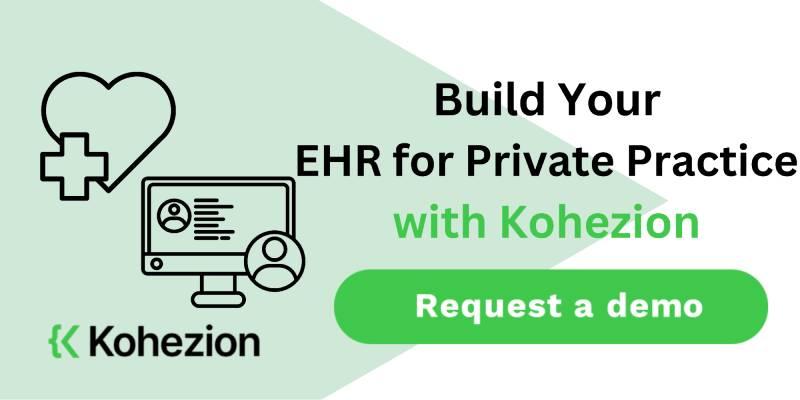Did you know over 90% of healthcare practices in the U.S. use electronic health record systems? This fact shows how vital EHR for private practice solutions are for better efficiency, improved patient care, and smoother workflows.
This article will explore the top 10 EHR solutions, their features, and how they can help your practice.
What is EHR for Private Practices
EHR stands for electronic health record, a digital version of paper charts. It changes how we handle healthcare info. In a private practice EHR definition, these systems are key. They make clinical workflows smoother.
They give healthcare pros quick access to patient data. This leads to better accountability and helps in making informed clinical decisions.
Using a healthcare EHR system can greatly benefit your practice. These tools help track patient data over time and improve patient record management. They make documenting, billing, and analyzing data easier.
This lets you focus more on patient care. You can manage administrative tasks more efficiently, too.
EHR vs EMR for Private Practices: What’s the Difference?
Knowing the difference between EHR and EMR can increase your practice's efficiency and patient care. Many think these terms mean the same, but they don't. An EMR is a digital patient chart for one practice only. It mainly tracks patient diagnoses and treatments within that practice.
An EHR, or electronic health record, goes beyond just medical information. It includes billing and treatment plans and lets you share data with other places. EHRs give a full view of a patient's health history, which is key for better care coordination.
Understanding the differences between EHRs and EMRs helps you choose the right system for your practice. EHRs help manage all patient information, leading to better healthcare. This knowledge helps you and your patients get the most out of electronic medical records.
Why is EHR for Private Practice Important
Understanding the importance of EHR in private practice is key. EHR systems change how doctors handle patient info. They make things run smoother, reduce mistakes, and improve health outcomes. EHRs give doctors a full view of patients' health history, helping them make fast, informed choices.
EHR is a must for practices dealing with Medicare or Medicaid. Many rules require using electronic records for billing, which makes getting paid easier and keeps your practice safe. It also simplifies handling patient records.
The impact of EHR on healthcare is big. It helps doctors work together better. Sharing medical records safely with specialists means everyone gets the information they need. This teamwork leads to better treatment plans and a better patient experience.
Benefits of EHR for Private Practice
Using an Electronic Health Record (EHR) system has many benefits for your private practice. It improves your practice's efficiency, helps with patient care, and increases productivity.
Increases Practice Efficiency
Workflows become smoother, meaning shorter patient wait times and lower costs. EHRs make your practice more efficient. You can spend more time caring for patients and less on paperwork.
Improves Patient Care Quality
EHRs give you quick access to full health records, which helps you make better decisions, provide high-quality care, and ensure better patient outcomes.
Facilitates Care Coordination
EHRs help doctors talk better with each other. This makes referrals and teamwork easier, especially for complex cases.
Streamlines Document Management
Going digital means less paperwork. Documents are easier to organize and find. This saves time and ensures accuracy, which is great for your practice.
Enables Secure Sharing of Records
EHRs let you share patient data safely. This helps doctors understand a patient's health better across different providers.
Optimizes Medication Tracking
Keeping track of prescriptions is easier and less prone to mistakes. This makes sure patients get the right treatment safely.
Prepares Your Practice for the Future
Choosing an EHR system prepares your practice for new technology and rules, helps you face future challenges, and keeps your practice strong.
Simplifies Billing and Coding Processes
Submitting claims automatically cuts down on mistakes. This makes billing easier and helps your practice's finances.
Reduces Paperwork and Administrative Burden
Less time on paperwork means more time with patients. This makes you more efficient and improves the patient experience.
Improves Patient Data Access and Retrieval
Easy access to health info helps you and your patients. It supports better decisions and a quicker healthcare response.

10 Best EHR for Private Practice
Here are 10 of the best EHRs for private practices in 2024:
1. Kohezion
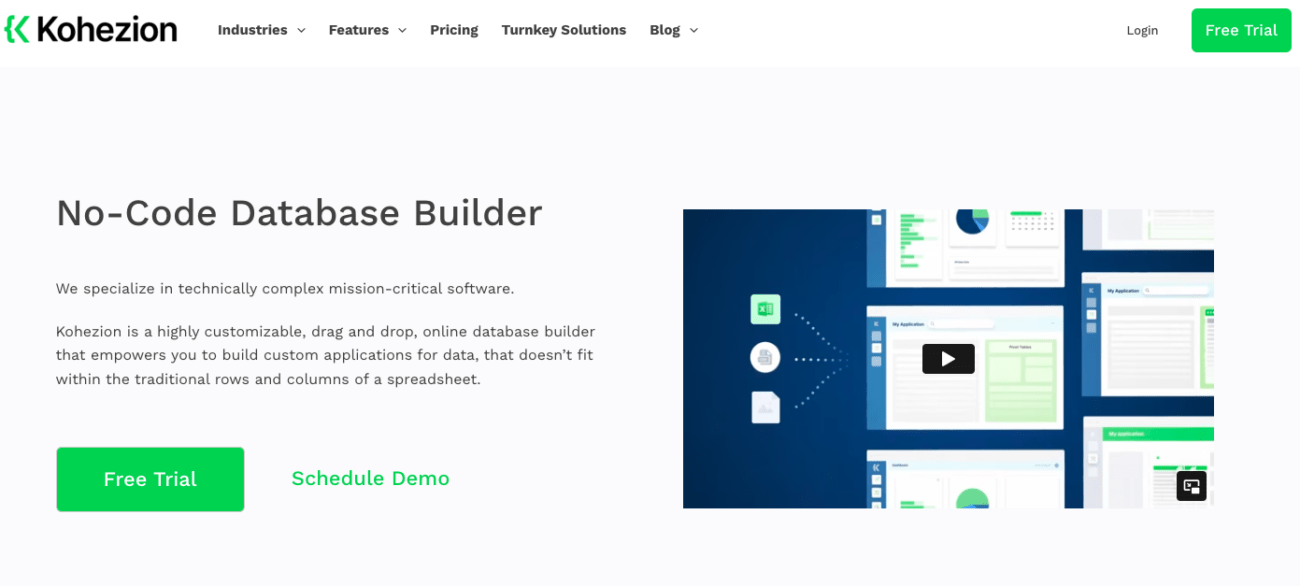
Kohezion is a customizable EHR solution designed to meet the needs of private practices. It allows practitioners to build tailored applications without coding, streamlining workflows and patient management. Its flexibility and focus on data management make it a popular choice for private practices.
Top 5 Features:
- A no-code platform for custom applications
- Cloud-based system for easy access
- Role-based access control for security
- Integrated reporting and analytics
- Automated workflows to reduce manual tasks
5 Benefits:
- Customizable to specific practice needs
- Simplifies patient data management
- Secure, role-based access improves data protection
- Improves decision-making with real-time data insights
- Increases efficiency with workflow automation
2 Cons:
- Requires time to learn customization options
- Limited pre-built templates for rapid setup
Best For:
Practices needing highly customizable, no-code solutions.
2. Praxis
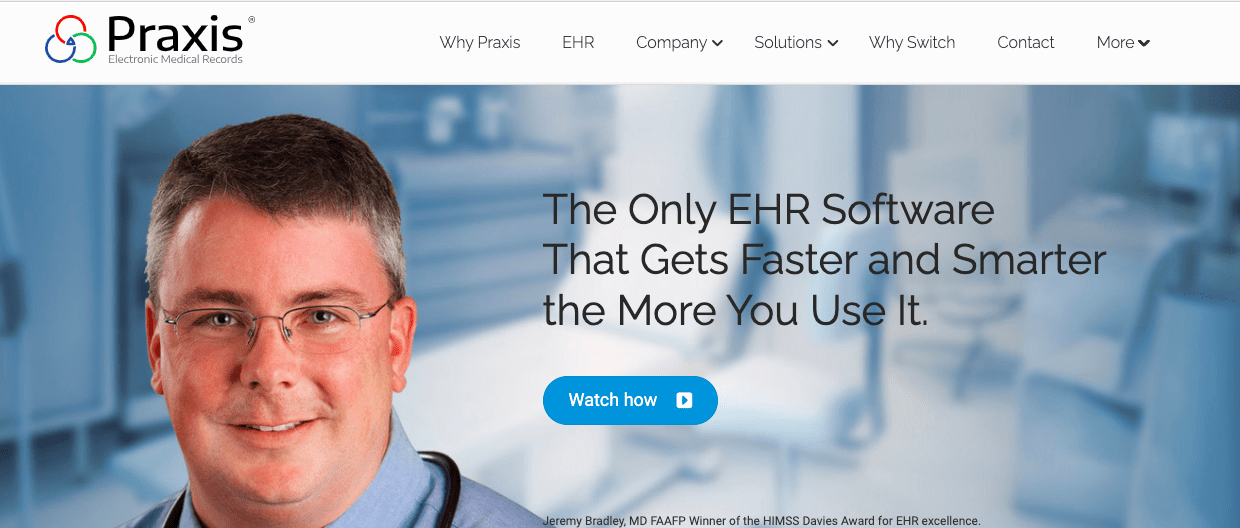
Praxis is an AI-driven EHR that offers adaptive learning to improve clinical workflows. It tailors itself to the physician’s style, creating an efficient and user-friendly experience. It is ideal for practices looking for a system that adapts to their specific needs without templates.
Top 5 Features:
- AI-driven, template-free documentation
- Knowledge-based learning system
- Customizable patient charting
- Real-time data reporting
- Cloud-based platform for mobility
5 Benefits:
- Increases documentation speed with adaptive AI
- Personalizes to physician’s workflow preferences
- Reduces documentation errors with knowledge learning
- Improves patient care with customized charting
- Enables remote access via the cloud
2 Cons:
- Steep learning curve for initial setup
- Lacks robust third-party integrations
Best For:
Clinicians looking for a highly adaptive, template-free EHR solution.
3. TherapyNotes

TherapyNotes is an EHR tailored for mental health professionals, offering specialized tools for documentation, billing, and scheduling. It integrates seamlessly with therapy practices, providing streamlined workflows and easy note-taking features.
Top 5 Features:
- Therapy-focused templates for notes
- Integrated patient portal for scheduling
- Billing and claims management
- Secure telehealth services
- HIPAA-compliant document storage
5 Benefits:
- Simplifies documentation for mental health providers
- Improves client engagement with the patient portal
- Automates billing and claim submissions
- Improves therapy with secure telehealth
- Ensures compliance with HIPAA standards
2 Cons:
- Limited customization outside of therapy-focused features
- No mobile app for patient access
Best For:
Mental health practices seeking specialized EHR solutions.
4. Practice Fusion

Practice Fusion is a cloud-based EHR designed for small—to medium-sized practices. It offers a user-friendly interface, medical billing, and patient scheduling features. Its affordable and scalable nature makes it an attractive choice for growing practices.
Top 5 Features:
- Integrated e-prescribing
- Patient scheduling tools
- Charting and documentation templates
- Medical billing and claims
- Lab and imaging integration
5 Benefits:
- Reduces prescription errors with e-prescribing
- Streamlines appointment scheduling
- Improves workflow efficiency with pre-built templates
- Automates billing processes
- Supports lab and imaging results integration
2 Cons:
- Limited customization options
- Customer support can be slow at times
Best For:
Small to medium-sized practices seeking a cost-effective, cloud-based EHR.
5. SimplePractice

SimplePractice is a versatile EHR solution for small practices, particularly in mental health. It offers a range of tools, from scheduling and billing to telehealth. It provides a user-friendly experience, making it ideal for solo practitioners and small teams.
Top 5 Features:
- Secure video telehealth
- Client portal for appointments and billing
- Integrated billing and claims submission
- Customizable progress note templates
- Scheduling with reminders
5 Benefits:
- Improves client interaction with telehealth services
- Simplifies client management with an online portal
- Reduces administrative tasks with automated billing
- Customizes notes to fit practice needs
- Increases patient retention with appointment reminders
2 Cons:
- Limited capabilities for larger practices
- Some features require additional fees
Best For:
Solo and small practices, especially in mental health, needing an all-in-one platform.
6. Remedly

Remedly is a comprehensive healthcare platform offering practice management, EHR, billing, and patient engagement tools. It is particularly suited for small to medium-sized private practices, helping streamline administrative and clinical operations.
Top 5 Features:
- Practice management and EHR integration
- Patient scheduling and reminders
- Automated billing and claims management
- Document and charting tools
- Analytics and reporting dashboard
5 Benefits:
- Improves practice efficiency with all-in-one management tools
- Improves patient engagement with scheduling reminders
- Simplifies revenue management with automated billing
- Facilitates better decision-making with analytics
- Customizable charts improve clinical documentation
2 Cons:
- Limited mobile functionality
- Can be expensive for smaller practices
Best For:
Small to medium practices seeking an integrated practice management and EHR solution.
7. DrChrono
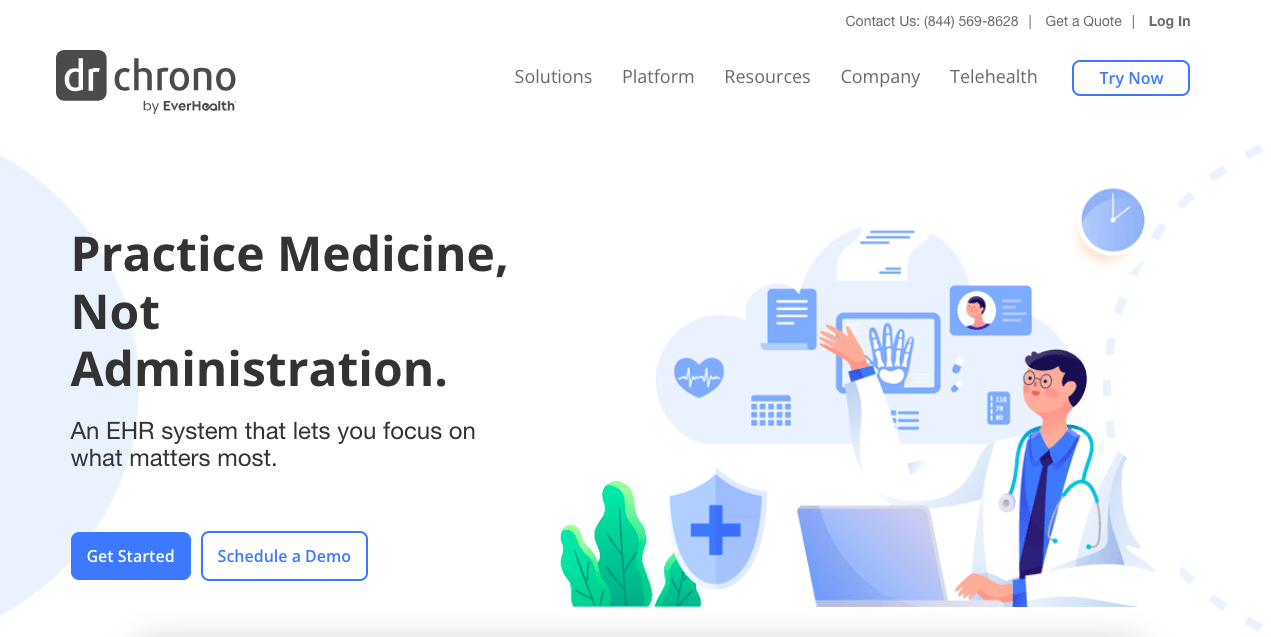
DrChrono offers a customizable EHR platform built for private practices. It features e-prescribing, patient check-in, and billing. The platform is highly regarded for its mobile-friendly design, making it ideal for practices on the go.
Top 5 Features:
- Mobile EHR application
- E-prescribing and medication management
- Customizable templates
- Patient scheduling and check-in
- Billing and coding tools
5 Benefits:
- Improves mobility with a robust mobile app
- Simplifies medication management with e-prescribing
- Customizable templates fit specific practice needs
- Improves patient experience with easy check-in
- Speeds up payment with integrated billing tools
2 Cons:
- Can be overwhelming, with too many features
- Additional costs for advanced features
Best For:
Practices that need mobile-friendly, customizable EHR systems.
8. Kareo
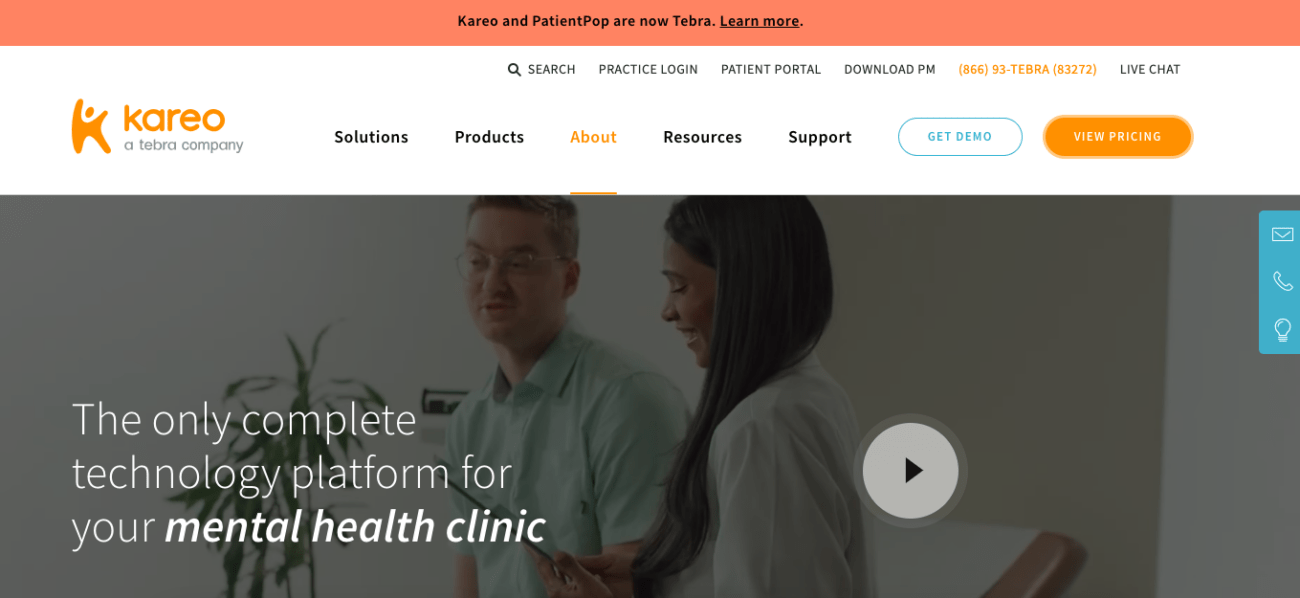
Kareo is a cloud-based EHR and practice management system designed for small practices. It includes features like billing, scheduling, and charting, making it a comprehensive solution for clinicians seeking to streamline their practice.
Top 5 Features:
- EHR and practice management integration
- Scheduling and appointment reminders
- Integrated billing and coding
- Customizable templates
- Patient engagement tools
5 Benefits:
- Reduces administrative tasks with practice management integration
- Improves patient retention with appointment reminders
- Simplifies billing and coding processes
- Customizes charts and documentation to practice needs
- Improves patient communication with engagement tools
2 Cons:
- Limited advanced analytics
- Can become expensive as you scale up
Best For:
Small practices needing a comprehensive, cloud-based EHR system.
9. eClinicalWorks
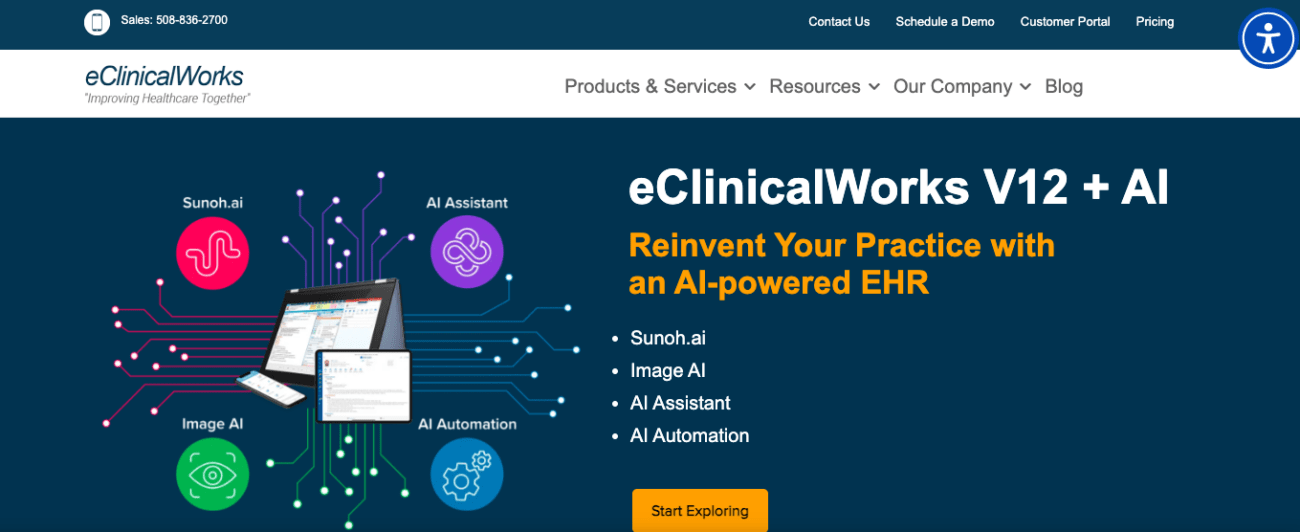
eClinicalWorks is a robust, cloud-based EHR solution used by practices of all sizes. It offers a wide range of features, including telehealth, patient engagement, billing, and advanced analytics. The platform is known for its scalability and flexibility.
Top 5 Features:
- Telehealth integration
- Patient engagement portal
- Advanced data analytics
- Billing and revenue cycle management
- Population health management tools
5 Benefits:
- Improves patient outreach with telehealth services
- Streamlines patient communication with a dedicated portal
- Enables data-driven decisions with advanced analytics
- Simplifies billing processes and revenue management
- Improves patient care with population health tools
2 Cons:
- Can be overwhelming for smaller practices
- Setup and implementation can be time-consuming
Best For:
Larger practices seeking a comprehensive, scalable EHR solution.
10. AdvancedMD
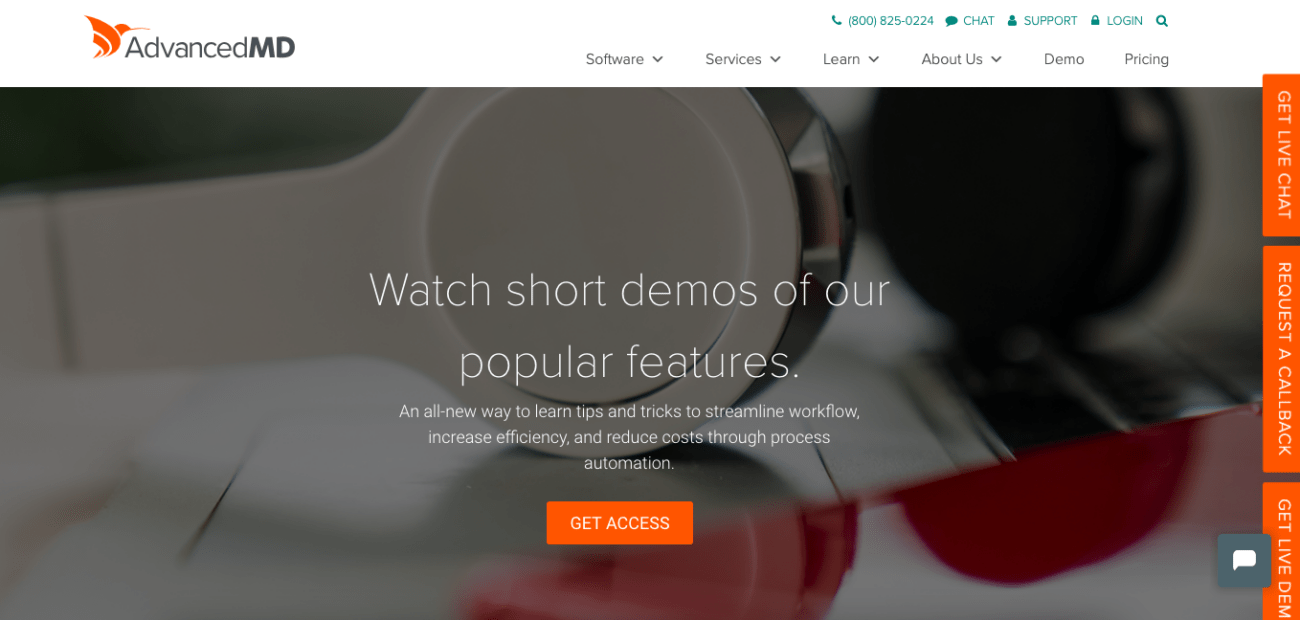
AdvancedMD provides a cloud-based EHR and practice management platform with a wide range of features for private practices. It offers a comprehensive solution for clinical and administrative tasks, from billing and scheduling to patient engagement and telemedicine.
Top 5 Features:
- Cloud-based EHR and practice management
- Telemedicine capabilities
- Appointment scheduling and reminders
- Billing and revenue cycle management
- Patient engagement tools
5 Benefits:
- Improves practice efficiency with integrated management tools
- Improves access to care with telemedicine services
- Reduces no-shows with appointment reminders
- Simplifies billing and revenue processes
- Strengthens patient communication and engagement
2 Cons:
- Expensive for smaller practices
- Initial setup and training can be challenging
Best For:
Growing practices seeking a full-featured, scalable EHR solution.
Top Features in EHR for Private Practice
Choosing the right electronic health record (EHR) system improves the functionality and efficiency of your private practice. Look for the best EHR functionalities that streamline processes and improve patient care. Here are some top EHR capabilities to consider:
Online Patient Portal
An online patient portal lets patients view their health records, book appointments, and talk to healthcare providers. This feature empowers patients and improves communication. It makes sure patients are more engaged.
Medical Billing System
Adding a medical billing system to your EHR makes billing easier. It reduces errors and speeds up payments, making managing your practice's finances more efficient.
Virtual Telemedicine Features
As remote healthcare is becoming more common, virtual telemedicine features let you care for patients from anywhere, making it easier for them to get treatment at home.
Inventory Tracking and Management
Good inventory tracking keeps clinical supplies in check. This feature makes ordering easier and ensures you always have what you need. It also cuts down on waste.
CRM Functionality
CRM functionality helps build strong patient relationships. It tracks communications and interactions, helping you give patients a personalized experience and increasing loyalty.
Data Analytics Tools
Data analytics tools help you make better decisions with patient data. They support improved care outcomes. This ensures you provide top-quality healthcare services.

Factors to Consider Before Choosing the Best EHR for Private Practice
It's important to know what makes a good EHR fit your needs. This will ensure that your practice runs smoothly and meets patient needs.
Features and Capabilities
Assess your practice's needs to determine what features you need. Important features include e-prescribing, scheduling, and detailed reports. The best EHR should have all these tools to improve your work.
Customization and Ease of Use
Find a system that can be customized for your practice's unique needs. It should also be easy for your staff to use, as this helps your team adapt faster.
Patient Portal
The Patient Portal allows patients to access their records. This feature is key to better patient engagement and satisfaction, as it changes how patients interact with their healthcare providers.
Implementation Duration and Expenses
Know how long it takes to fully integrate the EHR and the costs involved. Planning ahead helps manage your budget and avoid surprises.
Support and Training Services
Make sure the system comes with thorough training for your staff to make using the EHR easier.
Security and Compliance
Look at the EHR's security to ensure the safety of patient data and compliance with HIPAA rules. A secure system builds trust with patients.
Pricing Models
Check out different pricing options for EHRs. It's important to find a plan that fits your budget. The best EHR should have clear pricing without hidden fees.
Scalability
Think about whether the EHR can grow with your practice. A system that can handle more patients is better for the future, and this planning prevents problems later on.

Try Kohezion - The Best EHR for Private Practices
Kohezion is a top choice because it meets the specific needs of private practices, makes handling patient data easier, and saves time.
Kohezion's features are designed to simplify admin tasks. This means you can focus more on patient care. The platform also has a patient portal that makes talking to patients easy.
Kohezion works well with other healthcare systems, offering a strong yet affordable EHR solution. For private practices looking for quality and value, Kohezion is a great option.
Conclusion
The right EHR can make your practice run smoother and improve the care you give to patients. Using the latest private practice technology allows you to stay ahead in a changing healthcare scene.
This article has shown you several top EHR options for private practices. Each one is made to fit your practice's specific needs. It helps you manage patient records better and improves the patient experience. Getting a full EHR system is more than just a tech upgrade. It's a smart choice that keeps up with healthcare's digital shift.
Choosing the right EHR lets you focus on what's important—providing top-notch patient care and making your practice run smoothly. Take your time to look at all your options. Then, choose modern EHR systems that can help your practice reach its full potential.
If you're ready to explore how Kohezion can simplify and enhance your private practice with a customizable EHR solution, contact us today to learn more.
Start building with a free account
Frequently Asked Questions
Yes, you can switch to a different EHR system, but it may involve time and cost for data migration and staff training. To minimize disruption, make sure the new EHR supports data transfer from your old system. Plan for some transition time to ensure a smooth switch for your practice.
The cost of an EHR system can vary depending on the features and size of your practice. Most EHR providers charge a monthly fee per user, ranging from $100 to $500. Some systems also have additional costs for setup, training, or advanced features like analytics or telemedicine.
Not all EHR systems come with built-in telemedicine capabilities. If telemedicine is important for your practice, look for an EHR that offers secure video consultations and integrates telehealth tools. Some EHRs charge extra for telemedicine, so check the pricing details before deciding.
